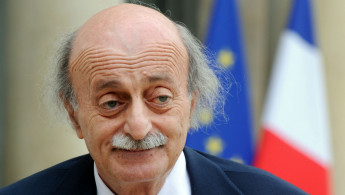Lebanon's Walid Jumblatt said he prefers death over Assad
Lebanon's political titan Walid Jumblatt said he would rather kill himself than work with Syria's President Assad and that he would like to see 'more US presence' in the region.
2 min read
The interview came before details of a plot against the politician's life emerged [AFP]
The head of Lebanon's Druze-majority political party has said he would rather commit suicide than make peace with Syria's President Bashar al-Assad.
Walid Jumblatt gave the controversial interview for a US-based research group and comes after claims that the Syrian regime tried to assassinate him.
Progressive Socialist Party (PSP) leader Jumblatt - a staunch opponent of the Syrian regime - said that he believed Assad would survive the current conflict in Syria.
But he told the Carnegie Middle East Center, that he would never forgive Assad for the devastation he has reaped in Syria, and the regime's veiled threats to escalate the fighting to neighbours such as Lebanon.
"I prefer to commit suicide on my own terms but not go to Syria and check in with Bashar," said Jumblatt.
He also gave a number of other controversial opinions in the interview on a range of topics, including intervention and relations with Israel.
When asked about the US' concern for the region, Jumblatt said that he wanted to see more intervention from the US.
"Of course more concern for the region, yes. More intervention, yes," he said.
The Druze leader also said that a peace agreement with Israel was necessary in order to assure stability in the region.
"[W]hen Obama went to Tel Aviv and addressed the young people of Israel, he said that one day they would have to accept a settlement with their neighbours, he said.
"It is a must, you cannot stay in this continuous state of war."
Jumblatt's interview came the day before the Lebanese ministry of justice announced details of a Syrian plot against his life.
A spokesperson for the Lebanese military, Riadh Abu Ghaida, accused two individuals named Mohammad Fakher and Mohannad Moussa of planning an assassination attempt in November.
Ghaida said that the two men had "old and established relationships with the Syrian intelligence services" and wanted to destabilise the Druze regions of Lebanon.
The Druze-majority party led by Jumblatt has backed the Syrian opposition in the war, while Syria's Druze population have lukewarmly supported the regime.
Jumblatt's father Kamal was one of the leading opponents of Bashar's father Hafez, during the Lebanese Civil War. He was assassinated by fighters allegedly on the behest of the Syrian regime in the height of the war.
Walid Jumblatt gave the controversial interview for a US-based research group and comes after claims that the Syrian regime tried to assassinate him.
Progressive Socialist Party (PSP) leader Jumblatt - a staunch opponent of the Syrian regime - said that he believed Assad would survive the current conflict in Syria.
But he told the Carnegie Middle East Center, that he would never forgive Assad for the devastation he has reaped in Syria, and the regime's veiled threats to escalate the fighting to neighbours such as Lebanon.
"I prefer to commit suicide on my own terms but not go to Syria and check in with Bashar," said Jumblatt.
He also gave a number of other controversial opinions in the interview on a range of topics, including intervention and relations with Israel.
When asked about the US' concern for the region, Jumblatt said that he wanted to see more intervention from the US.
"Of course more concern for the region, yes. More intervention, yes," he said.
The Druze leader also said that a peace agreement with Israel was necessary in order to assure stability in the region.
"[W]hen Obama went to Tel Aviv and addressed the young people of Israel, he said that one day they would have to accept a settlement with their neighbours, he said.
"It is a must, you cannot stay in this continuous state of war."
Jumblatt's interview came the day before the Lebanese ministry of justice announced details of a Syrian plot against his life.
A spokesperson for the Lebanese military, Riadh Abu Ghaida, accused two individuals named Mohammad Fakher and Mohannad Moussa of planning an assassination attempt in November.
Ghaida said that the two men had "old and established relationships with the Syrian intelligence services" and wanted to destabilise the Druze regions of Lebanon.
The Druze-majority party led by Jumblatt has backed the Syrian opposition in the war, while Syria's Druze population have lukewarmly supported the regime.
Jumblatt's father Kamal was one of the leading opponents of Bashar's father Hafez, during the Lebanese Civil War. He was assassinated by fighters allegedly on the behest of the Syrian regime in the height of the war.





 Follow the Middle East's top stories in English at The New Arab on Google News
Follow the Middle East's top stories in English at The New Arab on Google News
![The UAE is widely suspected of arming the RSF militia [Getty]](/sites/default/files/styles/image_330x185/public/2024-11/GettyImages-472529908.jpg?h=69f2b9d0&itok=Yauw3YTG)
![Netanyahu furiously denounced the ICC [Getty]](/sites/default/files/styles/image_330x185/public/2024-11/GettyImages-2169352575.jpg?h=199d8c1f&itok=-vRiruf5)
![Both Hamas and the Palestinian Authority welcomed the ICC arrest warrants [Getty]](/sites/default/files/styles/image_330x185/public/2024-11/GettyImages-2178351173.jpg?h=199d8c1f&itok=TV858iVg)